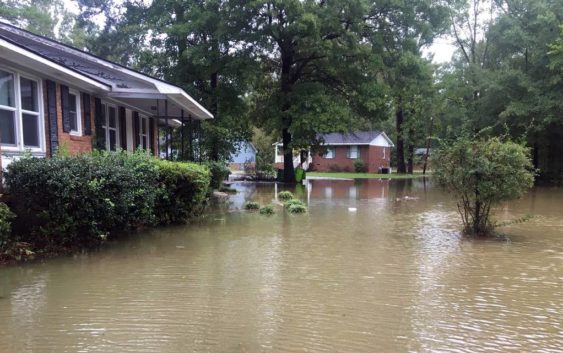- Austin adopts new map that greatly expands area at risk of wildfire
- CenterPoint Energy accelerates infrastructure improvements ahead of hurricane season
- Carolina Hurricanes playoff tickets go on sale Thursday
- Ask the Meteorologist: Why do tornadoes target Tornado Alley, Dixie Alley?
- Nonprofit closes distribution site that aided thousands after Hurricane Helene
Rising sea levels & fierce hurricanes: How SC plans to deal with increased flooding

State and coastal leaders say they’re determined to find solutions for generations to tackle flooding in South Carolina.
The S.C. Floodwater Commission, created in October by S.C. Gov. Henry McMaster, met for the first time Thursday.
“Our challenge is great, and out time is short,” said commission chairman and Camden attorney Tom Mullikin Sr., former commander of the S.C. State Guard.
“We find ourselves on the horns of a three-front quagmire,” Mullikin said. “We have coastal erosion that is complicated by recurring extreme weather systems; we have nuisance flooding along our coastline; and we have flooding in our river systems across South Carolina from rushing watersheds in North Carolina from extreme weather originating in the Gulf.”
$20 for 365 Days of Unlimited Digital Access
Last chance to take advantage of our best offer of the year! Act now!
#ReadLocal
About 50 government officials, business leaders and academic experts gathered in Columbia to serve on one of 10 task forces to develop short- and long-term recommendations to alleviate and mitigate flood impacts “from the sea to the Upstate.”
Members includes two coastal congressmen — Charleston Democrat Joe Cunningham and Myrtle Beach Republican Tom Rice — eight state agency heads and five coastal mayors.
“I believe in brain power, and there’s plenty of it in this room,” McMaster said. “This is a broad, collaborative approach to a pressing need in South Carolina that has great possibilities. … We have an opportunity to do things we have not done before.”
Historic flooding has swamped communities from the Upstate to the Midlands to the Lowcountry over the last four years as a result of high-tides, storms and hurricanes.
And several landmark reports on climate change released this year predict thousands of homes and businesses in the Carolinas could be at risk from more intense storms and coastal flooding driven by rising ocean temperatures and higher sea levels.
The Fourth National Climate Assessment, released last month and led by the National Oceanic and Atmospheric Administration, states climate-related damages hit a record breaking $306.2 billion in 2017.
The Columbia area is on track to record — if not surpass — the 10th wettest December in the city’s history.
Almost 5 inches of rain, nearly 3 inches more than normal, fell across the area this month.
December’s rain — compounded with higher than normal rain in October and November — has caused flooding in some parts of the state’s capital city. But coastal areas have been harder hit, as flooding has closed main traffic arteries, particularly in and around downtown Charleston.
“It impacts our entire state, from dams to river flooding to coastal erosion. But for coastal areas it is really an existential … threat,” said Charleston Mayor and commission member John Tecklenburg. “It’s a complex issue, but it’s broken down very methodically. If you had one group trying to bite the whole elephant, you wouldn’t get there. … And I feel the energy. I feel the commitment here.”
The commission will evaluate how artificial reefs could reduce coastal flooding and how to best protect the state’s electrical grid from storms. Commission members, too, will look at shoreline stabilization methods like bulkheads, and will examine ways to reduce urban flooding through use of green space and permeable pavement.
Others groups will look at developing canal systems along the coast and Lowcountry, expanding the state’s lake system and securing federal funding.
More immediately, commission members will focus on identifying and prioritizing repairs to culverts, ditches and other drainage systems to alleviate neighborhood nuisance flooding.
One area, however, the commission will not tread is climate change and emissions strategies.
“We are going to deal with the real-time impacts of a climate that has changed throughout all of time,” Mullikin told reporters. “We — the governor — is not entertaining a political conversation … to what degree man’s actions have amplified global climatic change. We are here to talk about the immediate and long-term expectations (of flooding in the state).”
Mullikin stressed “our efforts will be neither piecemeal nor driven by special interests.”
“We intend to identify and unleash the tremendous talents across our state with a ‘big-tent’ approach,” he said. “Our efforts will not be easy, and we will not simply try to pull the may diverse stakeholders to the center. We will lead everyone to the higher ground.
“We intend to make water our friend.”
The full commission is scheduled to meet again in February.
Staff writer Maayan Schechter contributed to this story